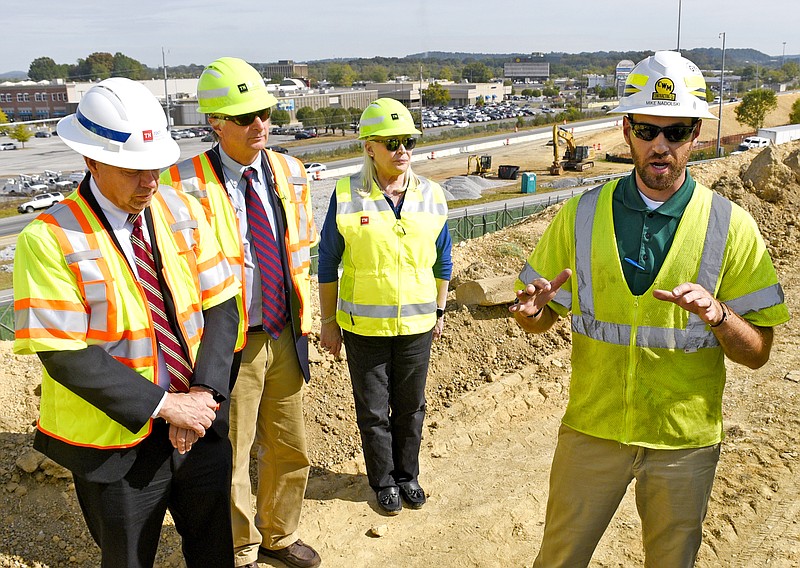The massive pile of dirt looming over the landscape where Interstates 75 and 24 part ways is an early sign of the scope of the work that lies ahead.
The $132.6 million, three-stage project to improve the notoriously congested and wreck-prone interchange will take just shy of two-and-a-half years and require the patience of millions of drivers making their way through The Split. There are traffic headaches ahead, but they'll pay off, said Tennessee Sen. Bo Watson, R-Hixson.
"One of the best things that can happen to us is people complaining about road construction," said Watson, who joined a crew of local lawmakers and officials from the Tennessee Department of Transportation at the site on Tuesday afternoon.
"By the time they finish this, the state will have invested north of $1 billion in road improvements in our area in the last eight to 10 years. There's clear recognition that this area of the state is a huge hub for transportation."
Decked out in fluorescent hard hats and safety vests, the group drove up what they jokingly call Mt. Matthews - a massive hill of dirt named for C.W. Matthews, the contractor out of Atlanta that's doing the work. Tennessee Transportation Commissioner Clay Bright was paying his first visit to the site, the second-costliest road project in the state.
"Once you get through a project like this, people always wonder why we didn't do it sooner," Bright said.
Tennessee's priciest project is Interstate 440 in Nashville, with a tab of $154 million. That project and the work at The Split are using the "design/build" approach, which speeds up progress and allows projects to get started while some elements are still being finalized, Bright said.
Overlapping the design and build phases will save about a year and a half, he said. C.W. Matthews is experienced in that approach, and using that contractor to do this work makes sense in terms of both tighter timelines and lower costs, he said.
"I think the public expects more of us than they used to," Bright said. "The approach to this is pretty unique for us."
Objectives
* Widen Interstate 75 to include an additional lane in each direction* Widen all interstate-to-interstate ramps* Make I-75 the mainline route with I-24 ramps exiting and merging on the right side* Create an auxiliary ramp system for traffic entering the interchange from Ringgold Road and the Welcome Center* Cost: $132.6 millionTo receive updates from TDOT visit here.
A recent report from the state gave the interchange an "F" for congestion, and it predicted the project would bring the grade only up to a "D" by 2040 if there were no other work in the corridor in the next two decades. TDOT spokeswoman Jennifer Flynn, however, said that grade is not as dire as it sounds. "The level of service in some areas of the interchange would be a D in 2040 if we never, ever do anything else to the area between now and 2040," she said. "Also, there is a level of service E in the mix, so a level of service D is still considered to be average. This project will definitely improve the area."
Once the interchange work is done, TDOT projects it will continue to make improvements along the roadways beyond the interchange, which is what it will take to keep up with continued growth in the area, said Bridgett Massengill, president and CEO of Thrive Regional Partnership.
"What we heard from TDOT was that it is, in essence, adding capacity to the best of their fiscal abilities right now, but that letter grade applies to the entire 75 corridor," she said.
The project at the interchange will widen and reconfigure 2.7 miles of roads, making I-75 the main route through the interchange and eliminating all left-side exits and entrances onto the roads, said Paul Degges, TDOT's chief engineer. The design also calls for fewer bridges, and that's a big plus, he said.
"They'll cut in half the number of bridges and, as an owner, that's a good thing for the state to have fewer bridges to maintain," Degges said.
Project manager Mike Nadolski said the initial - and currently most visible - stage of the work involves moving in the massive quantities of dirt that will be used as the project gets going over the coming weeks.
"This project will require 1 million cubic yards of dirt, so this allows us to truck in and store the dirt that we'll need to do the work while we're still getting the permits and designing the interchange," he said. "We can bring in several thousand yards of dirt per day."
Most of the work will be done without any interstate lane closures, but there will be four weekend lane closures in 2020, which TDOT will warn drivers about well in advance.
"Lanes can only be closed for 45 hours a week," Nadolski said. "That's not very many hours to work with."
C.W. Matthews has 865 days to complete the project, and the clock started ticking on that deadline on Jan. 18. If the contractor misses the deadline, the penalty is $30,000 a day starting with day 866, transportation officials said.
Contact Mary Fortune at mfortune@timesfreepress.com or 423-757-6653. Follow her on Twitter at @maryfortune.

